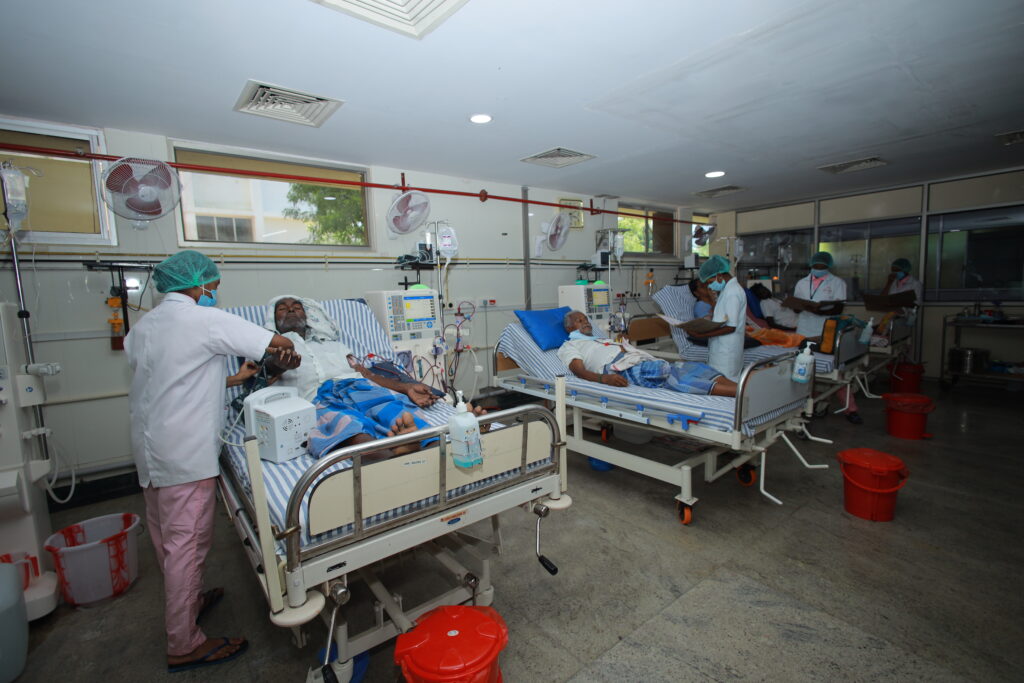Nephrology
- Home
- /
- Nephrology
Meet Our Team
The Vikram Hospitals plays a statewide services includes the Acquired

DR. P. ARUN PRASATH MD( Gen Medicine)., DM(Nephrology).,
Consultant Nephrologist
DEPARTMENT OF NEPHROLOGY:
At Vikram Multispeciality Hospital, our Nephrology Department provides a comprehensive range of outpatient and inpatient services, utilizing state-of-the-art procedures and technology for the assessment, management, and treatment of various renal conditions.
Outpatient Nephrology Services:
- General Nephrology Clinics offering assessment, investigation, and comprehensive management of various clinical conditions, including:
- Proteinuria (Protein in Urine), Hematuria (Blood in Urine)
- Acute and chronic nephritis
- Nephrotic syndrome
- Urinary tract infections (UTI)
- Rapidly Progressive Glomerulonephritis (RPGN)
- Diabetic nephropathy
- Hypertension (including Resistant hypertension)
- Kidney stones
- Lupus nephritis (Systemic Lupus Erythematosus – SLE)
- Chronic kidney disease (CKD) from stage 1-5
- Pre-ESRD management – delaying the need for dialysis/ preparing for dialysis
- Preparing End-stage Renal Disease (ESRD) patients for Renal Transplantation
Inpatient Nephrology Services:
- Admission and treatment of patients with acute/chronic kidney problems that require inpatient care.
- Dialysis and Related Procedures:
- State-of-the-art HEMODIALYSIS and HEMODIAFILTRATION (HDF) for ESRD patients on a regular basis.
- Vascular access procedures
- Temporary Femoral Vein Catheterization and Catheter Removal.
- Temporary Internal Jugular (IJ) Vein Catheterization and Catheter Removal.
- Permanent IJ Catheter Placement and Permcath Removal.
- Arteriovenous Fistula (AVF) Creation
- Kidney Biopsies
In Intensive Care Unit:
- Performing Hemodialysis, SLED (Slow Low Efficiency Dialysis), Intermittent Peritoneal Dialysis (IPD), and Vascular Access Procedures in acutely ill, unstable patients with severe renal failure, in ICU.
Frequently Asked Questions
What is nephrology?
Nephrology is the medical specialty that focuses on the diagnosis and treatment of kidney disorders and diseases. Nephrologists are trained to manage various kidney-related conditions, including chronic kidney disease, kidney stones, hypertension (high blood pressure), and kidney infections.
When should I see a nephrologist?
You may consider seeing a nephrologist if you have symptoms or conditions related to kidney health, such as persistent changes in urination, blood in the urine, uncontrolled high blood pressure, or a family history of kidney disease. Nephrologists are also involved in the care of patients with chronic kidney disease (CKD) and those requiring dialysis or kidney transplant evaluation.
What does a nephrologist do during a consultation?
During a nephrology consultation, the nephrologist will conduct a thorough medical history review, perform a physical examination, and may order diagnostic tests such as blood and urine tests to assess kidney function. Based on the evaluation, they will provide a diagnosis and recommend a treatment plan tailored to your specific condition.

